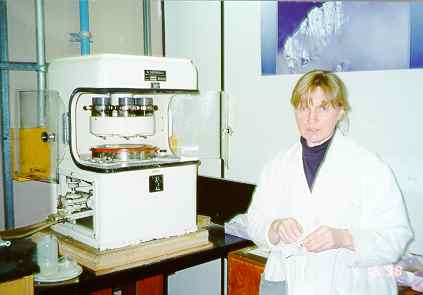Mineralogy Services
Lakehead University's Instrumentation Laboratory, in association with Drs. Andrew Conly and Roger Mitchell of the Geology Department, are pleased to offer mineral analysis services which should be of interest to exploration, assay and mining companies. Clients can access the facilities directly. Training for client staff with a background in mineralogy is available.

Geology Department Mineral processing Laboratory
Services
- Thin Section preparation.
- particle sizing and elemental composition.
- particle characterization of assay grinds using digital image analysis.
- Mineralogical/petrographic assessment of geological samples using SEM/EDS, XRD and optical microscopy.
- Diamond-bearing indicator minerals.
- Study of mineral concentrates with diagnostics of phases present, study of morphology of grains (incl. degree of their rounding in placers or in kimberlites) using SEM/BSE imagery and quantitative and semi-qualitative EDXA low-vacuum analyses.
- Alkaline mineralogy and petrogenesis.
- pGE-bearing phases and sulphides.
- Compositional trends of ilmenite, spineloids and other key minerals.
- Quantitative or qualitative phase composition analysis of solids including rocks, ores, industrial minerals and any other aggregates; mineral concentrates (from dressing plants or placers); sludges; as well as any products, by-products and tailings. The quantitative analysis is based on Rietveld method applied to high-resolution X-ray powder diffraction patterns.
- Study of compositional characteristics of rocks, ores, and economic minerals including revealing of possible compositional inhomogeneity zoning), presence of inclusions, intergrowths, conspicuous alteration, and revealing of possible valuable by-products using the qualitative analyses with well-standardized SEM-EDXA coupled with SE and/or BSE digital scanning imagery.
- Synthesis of certain ceramics solid solutions and provide refinement of their crystal structures useful for development of new materials for solid disposal forms of various tailings and wastes, special crystalline cements.
Expected time for performance of the phase composition analyses is a business week (1-10 analyses) with possibility of urgent analyses in 1-2 days including week-ends. A qualitative analysis takes 2-3 hours (1.5 h XRD pattern scan, 0.5-1 h interpretation with EVA Bruker analytical software package, and time for report writing); a quantitative XRD analysis lasts longer (full scan for the Rietveld refinement using TOpAS Bruker analytical software package is 8 h, interpretation takes commonly about 2-3 h).
In the case of complex X-ray diffraction patterns with reflection overlaps hindering phase interpretation, we would perform SEM-EDXA analyses employing well-characterized synthetic and natural analytical standards and back-scattered electron (BSE) imagery (the latter also allows assessment of the consistency and grain size of the samples.
For collaborative research projects, please contact:
Dr. Andrew Conly provides strong research and teaching presence in mineral deposit geology, aqueous fluid and isotope geochemistry and environmental mineralogy / geochemistry, so as to maintain the Department of Geologys strong track record of research in the Canadian Shield and to expand its capacity in applied mineralogy and geochemistry. Dr. Conly's research is in the general area of water-rock interactions, in which he attempts to characterize mineralogical and chemical changes resulting from water-rock interactions in order to constrain the reaction processes and pathways. Dr. Conly's research integrates natural systems with water-rock reaction experiments.
Tel: 807-343-8463
Email: andrew.conly@lakeheadu.ca
Dr. R. H. Mitchell research interests focus is on the mineralogy and petrology of kimberlites and alkaline rocks and is concerned with the recognition and evaluation of diamond, rare earth element, strategic metal (Be, Zr, Nb, Ta, Th, U, pd, Ir, pt etc)-ore deposits, and has applications with respect to radioactive waste disposal and solid state/ceramic industrial materials. Dr. Mitchell is the university's only Fellow of the Royal Society of Canada, and is past president of the Mineralogical Association of Canada.
Tel: 807-343-8463
Email: roger.mitchell@lakeheadu.ca
Dr. Francis Appoh is the Director of Analytical Services and Research. He is responsible for the Lakehead University Instrumentation Laboratory. But he also serves as Director of the Centre for Analytical Services (LUCAS) and Director of the Paleo-DNA Laboratory. For more information on mineralogy services through the instrument laboratory contact Dr. Appoh.
Tele: 807-343-8853
Email: fappoh@lakeheadu.ca
A complete list of analytical services offered by LUCAS Laboratories can be found on the LUCAS services page.
Brochure
Reference Sites:
Mineral Database: http://webmineral.com/

